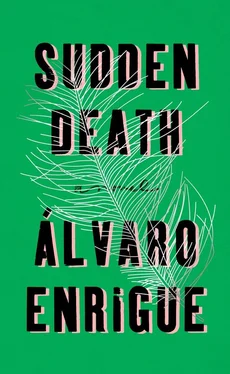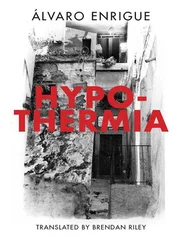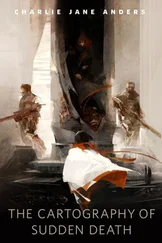It’s Mexican.
The cardinal furrows his brow.
PIUS IV (CONT.):
It was sent to me by a bishop there. It isn’t painted, it’s made of feathers: look, it’s a little masterpiece.
The servant holds it out to the cardinal and he takes it, disdainfully.
BORROMEO:
(ironically)
Such intricate handiwork, Your Holiness.
He sets it on his knees.
PIUS IV:
May it help you to remember that France isn’t the whole world, that there are many lands and many souls.
The cardinal sits watching him, making a show of patience.
PIUS IV (CONT.):
Look at it! If you hold it up to the light in just the right way, it glows.
Borromeo tilts his head, turns the thing.
PIUS IV (CONT.):
Lift it a little.
When it’s just above his head, the colored feathers of the miter blaze as if struck by a bolt of lightning. Borromeo drops it, and it falls into his lap. The pope laughs.
PIUS IV (CONT.):
What did I tell you?
BORROMEO:
Mexico: the Devil’s haunt.
PIUS IV:
It’s the work of Christian Indians.
BORROMEO:
What am I supposed to do with it?
PIUS IV:
Say Easter mass in it.
BORROMEO:
Why?
PIUS IV:
Because after the dark always comes the light.
BORROMEO:
I know that.
PIUS IV:
No one would guess it.
The pope cut another slice of sausage and closed his eyes as he chewed, thinking that even when Nero burned Rome the fuel ran out eventually, and the two-thirds of the city left waste was rebuilt magnificently. He could almost smell the blanket of ashes that Trent would leave at his feet. He could see how, in the end, once everything was over, a new tree would spring up from the field of ashes, embryonic and amber-hued; a tree of sinew and muscle, its first limb reaching up through the earth; a tree that — once the smoke from the blaze had cleared — would spread its fingers in the sun like a butterfly of flesh. The butterfly’s fingernails would be dirty.
Light to the Living and Lessons from the Dead

ACCOUNT NUMBER 168.
Once again, a dead man appeared to me, calling me by name, saying that he hadn’t come to frighten me, but to ask me to commend him to God, that he was Don N, doing penance in Purgatory. In his hand he carried a ball of fire, and his dry tongue protruded from his mouth. I asked: Why are you there? He answered: For the sins of ball-playing and partaking of cold refreshment. He made a reverence to the cross and disappeared, saying: Jesus be with you.
JUAN DE PALAFOX Y MENDOZA, Archbishop and Viceroy of New Spain, 1661

By the time Cortés and Cuauhtémoc met, the Spaniards were more than familiar with Tenochtitlan and had been thoroughly observed by half the city, out on walks that exposed their vulnerability. The Mexica people asked themselves, in ever more insistent tones, why Moctezuma didn’t surround these interlopers and kill them once and for all. It would be interesting if history had taken a turn in that direction. From a contemporary perspective, Cortés and his company would be like those lesser martyrs who made the miscalculation of going to preach the gospel in Japan.
There would have been a Saint Hernán of Medellín and a Saint Bernal of Medina del Campo. Velázquez would have painted an altarpiece in which their heads appeared at the foot of the temple of Tezcatlipoca, and Caravaggio another called The Martyrdom of Saint Jerome of Aguilar : a canvas that captured Cortés’s translator’s terror just before his tongue was cut out. Beside him, covering her mouth, one of Merisi’s tarts would have played an approximate green-eyed Malitzin. It would be a chiaroscuro set in small-town Rome, remote and squalid, as Europe always was and would have continued to be if not for the flow of American ore.
Malitzin told Cortés that Cuauhtémoc had approached her. They had just been making love, as so many cheesy writers would have it, though for La Malinche and the captain — scarcely equipped for such a thing — it was more like the scuffling of two blind children.
The conquistador panted, lying on his belly on the cotton pallet as the Mayan princess turned translator, now lubricated with semen, dug about in her pubic hair in the hope of giving herself the satisfaction her man hadn’t provided. I saw Cuauhtemoctzin in the market today, she said, kneading the clitoris that changed the world. By now, Doña Marina was the only one of Cortés’s associates who could go out into the city without being escorted by an armed company. She was also, at least in Cortés’s not inconsiderable experience, the only woman who could do politics and masturbate at the same time.
The captain moved next to her and sniffed her armpit. He squeezed the hand that she was touching herself with, without preventing its circular motion. Who is that, he asked. Moctezuma’s favorite captain. And why does it make you so hot that this captain wants to talk to me? Still touching herself, she said: Because men who do it with men turn me on. She closed her eyes. Cortés let her continue. Before burrowing entirely into her own pleasure, she added: He said that he wanted to take you to the ball game tomorrow. Then, in order to come, she found her way to a world in which men weren’t animals.
He waited for her to finish, tugging at his beard. When he sensed that she was back, he asked: Do you think it’s to kill me? Her breathing was still ragged when she answered no, that he was a decent sort. Though she had stopped feeling her sex, she protected it with her hand: she hadn’t finished; she was resting. The emperor doesn’t understand why we haven’t left, and he thinks that if someone makes an effort to talk to you, maybe you’ll explain. Cortés lifted her hand with what he imagined was delicacy and blew on her. She shivered. Should we believe him? Cuauhtemoctzin is to be believed — he has no flaws, he’s a hero, a fanatic; everyone knows that sooner or later he’ll be emperor, even he knows it. Cortés made a gesture of unease, indicating that he wasn’t convinced by Malinche’s confidence. He returned her hand to her sex. She scratched her pubic hair. She said: The truth is that I asked him to kill you; if Moctezuma can’t bring himself to do it, sooner or later the people will rise up and nos van a xingar a todos , we’ll all be fucked, not just you, the only one who thinks it’s a good idea for us to stay here and do nothing. We’re reconnoitering the plaza, Cortés explained in the bureaucratic tone he had used many times to tell his men why he was subjecting them to a risk they all found unnecessary, but he realized that Malitzin was already off again. With her head thrown back, the translator was imagining Cuauhtémoc — so smooth and hairless — sodomizing the conquistador. He smelled her neck, let her come, and when she had finished climbed on top of her. She asked him to bite her breasts. He loved them, so dark and erect. She came again. He didn’t. Collapsed on Malinche, he asked: Should I go? You can’t not go; it’s Cuauhtemoctzin, he gives the orders; he said he would be there early because it will be crowded. We’ll have to tell the troops. He wants us to come alone. He’ll betray us. He’s a man of his word. I am too, said Cortés, and raising himself on his arms and the tips of his toes, he left a space for her to turn over to offer him her ass. Your people don’t know what it means to give your word, she said, squeezing his cock between the hemispheres of her buttocks. When he felt that he had recovered his full erection he lifted her up by the hips and thrust into her without ceremony. She whimpered. A talk, captain to captain, he said as he drove down. She turned her face so that she could see his eyes when she said: You aren’t a captain like him. The Spaniard thrust deeper, and pulled her violently by the hair, murmuring in her ear: I’m better. Ay guapo, she said between gasps; he isn’t a peasant who got lucky.
Читать дальше













